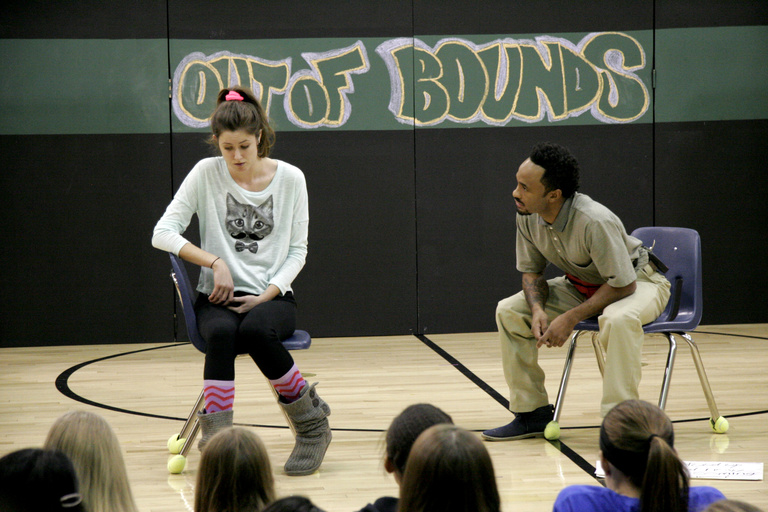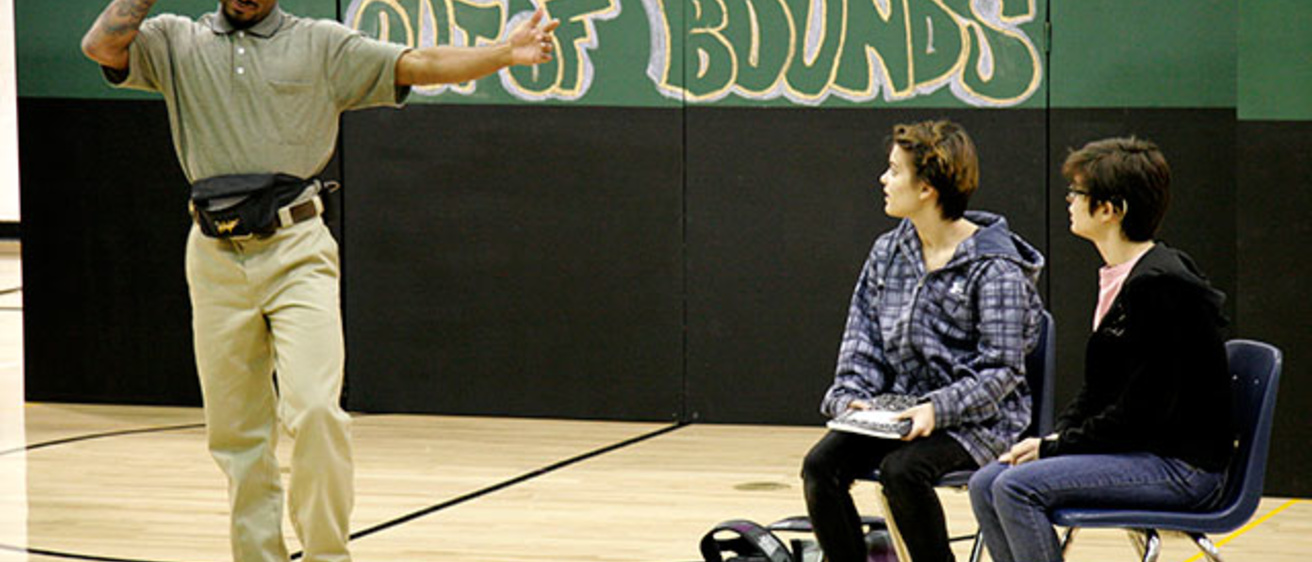Out of Bounds, a new play by Iowa City’s Working Group Theatre, is not the first attempt to deal with cyberbullying in schools, but it may be among the first in the nation to be evaluated through the critical lens of scientific research. The goal is to see if appealing to adolescents’ emotions is more effective than academic learning in changing bullying behaviors.
The play premiered Nov. 18-20 in Iowa City junior high schools, where it was followed up by some interesting online discussions, including a Twitter Challenge at Northwest Junior High, which led to tweets like these:
"Haters can be your motivators."
"I would rather be a nobody then someone who is mean just for the fun of it."
"Don't fall into what the #bullies said you are good enough for being yourself."
"Speak up! You never know when what you say will change someone's life. It's up to you!"
"Knowing what's right doesn't mean much unless you do what's right."
For the next step, the play's creators hope to take the show on the road, to schools around the state, with the goal of generating more feedback.
It was back in 2003 that Hancher Executive Director Chuck Swanson and Pam Ehly, curriculum director for the Iowa City Community School District, became involved with Partners in Education, a program supported by the Kennedy Center in Washington, D.C.
Then, when the Kennedy Center created a new program, Any Given Child, which helps communities expand arts education in K-8 schools, Hancher and the Iowa City Schools were primed to apply and became the eighth city in the U.S. to be selected to participate. The initiative is a collaboration among the University of Iowa’s Hancher, which commissioned the work; Working Group Theatre, the Iowa City Community School District, the UI College of Public Health, and the UI Injury Prevention Research Center. And it’s a tribute to the value of creating and maintaining relationships over time.

With help from the Kennedy Center, a team of 30 community members was assembled and crafted a mission statement and goals in response to an in-depth analysis of current arts activities in the schools.
A number of opportunities were identified in areas with particular room to increase arts engagement. Grades 7 and 8 typically have fewer arts activities than younger grades and theater is not as well represented as other disciplines. Because Hancher already had a relationship with Working Group, which focuses on dramatizing societal issues, they approached the group about the possibility of developing a show for junior high students.
After meeting with Ehly and others, the topic of cyberbullying rose to the top as a topic to explore.
“It was one of those perfect storms where we had a need, and they had an interest,” Ehly says.
Meanwhile, Swanson got to know Susan Curry, who became dean of the College of Public Health in 2008, because she frequented Hancher performances and because they met in person through Rotary. As Curry recalls, “At one point, we were literally in the food line at Rotary and Chuck said, “We’re going to do something together; I don’t know what it is yet, but we’re going to do something together.”
Last year Curry asked Swanson to talk with the College of Public Health Advisory Board, where he mentioned Out of Bounds. Two members of that audience were especially intrigued. Marizen Ramirez, UI associate professor of occupational and environmental health, and Cori Peek-Asa, professor in the same department, were in the midst of a research project to evaluate Iowa’s recently enacted anti-bullying law when they heard Swanson’s talk. Both are affiliated with the university’s Injury Prevention Research Center, which has an interdisciplinary expert research team in violence prevention. They approached him immediately after his talk and asked how they might get involved.
That approach was smoothed by the well-developed relationship between Hancher and the college, which included collaboration on The Broken Chord, a Working Group Theatre play examining the effects of Alzheimer’s Disease on families and caregivers.
“The great thing about having groups that talk to each other and know each other is that we could just start this running,” says Peek-Asa. “There was already a lot of trust and familiarity between the College of Public Health, Hancher, and Working Group Theatre.”
Because they were already in the middle of the research project, which is being funded by the Robert Wood Johnson Foundation, they were able to provide important background to Iowa City Schools and Working Group Theatre playwright and co-founder Jennifer Fawcett.
“Based on reports of students who are filling out surveys, national rates of bullying range from 10 percent to 35 percent, but in our state, we have rates at around 50 percent,” Ramirez says.
Knowing that Fawcett is interested drawing on real-life experiences, the researchers shared what they had found from interviews with middle school administrators. “Based on our first set of interviews, we know that cyberbullying is their main concern,” she notes, adding that the Iowa Department of Education says that about half of the reports it receives on bullying have a “seed that starts in cyber space.”
In addition to the insights provided to the playwright, Ramirez and Peek-Asa have created a resource guide to help prepare students for the play, to discuss it afterwards, and even to write their own scenes in an effort to get them to empathize with victims of bullying.
“It’s a really interesting hypothesis to ask if we appeal to students’ emotional system through theater and expression and see if that’s an avenue to change their behavior,” Peek-Asa says. The researchers are hoping that such an approach will be more effective than merely academic programs, whose effects “have been mild at best,” she adds.
Iowa City Schools’ Ehly echoes that hope. “We know that there are multiple ways to learn information: auditory, visually, cognitive, and the emotional connection,” she says. “For all children, when you learn in multiple ways, the storage of information on your long-term memory is enhanced. So seeing through performance is a viable option for learning.”
Ramirez and Peek-Asa are also working with their college’s representative from the UI Foundation for funding that would allow Working Group Theatre to take the play into middle schools around the state to test the hypothesis on a wider group of students.
“With that pilot data, we’re in a great place to write a major federally-funded grant to do a more structured, randomized trial of the tool kit,” Peek-Asa says. That work would include surveys of students’ knowledge of and attitudes towards bullying before and after the play as well as comparison with student attitudes at schools using only traditional curriculum.
Don’t be surprised if Hancher is somehow involved in that continuing effort as well as new collaborations with the College of Public Health.
“We work together so well,” Swanson says. “We’re both about improving the lives of Iowans. This is building on a very rich relationship.”
Curry agrees: “What’s important is the intuitive sense that the mission of public health and the mission of the arts are aimed at the betterment of community and people. We know that in our bones, and we’ve been able to translate it into concrete projects and collaborations.
“These kinds of collaborations also help to demystify public health,” she adds. “We are committed to building that bridge between what we know and what we should do. It’s great to have made direct connections now with the school administrators who have to implement programs to reduce bullying. With that connection, once we discover more about what really works, it will be so much easier to deliver that knowledge to those colleagues.”
See Hancher's website for an interview with Out of Bounds playwright Jennifer Fawcett.
